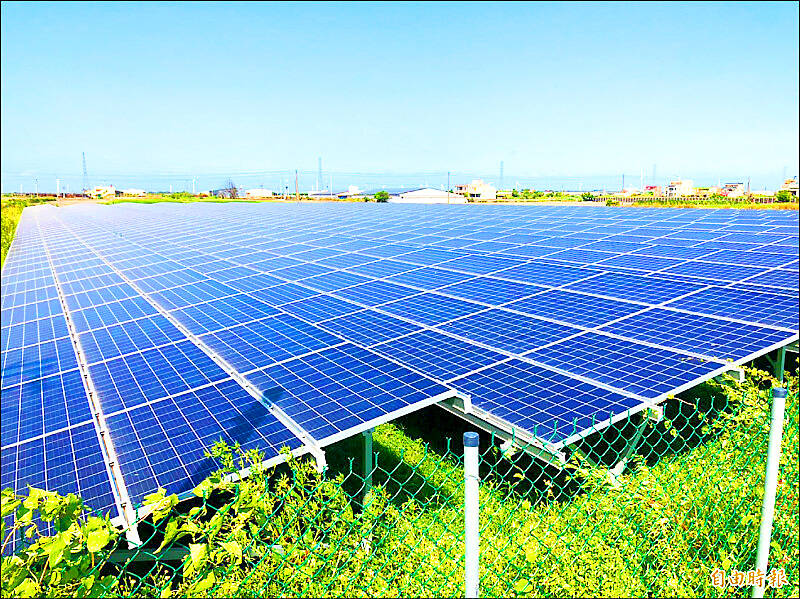A national security crisis could occur due to a high percentage of China-made inverters installed in Taiwan’s solar energy systems, and lawmakers should keep the Ministry of Digital Affairs (MODA) and Taiwan Power Co (Taipower) in check over the issue, an information security expert said on Friday.
National Cheng Kung University electrical engineering professor Li Jung-shian (李忠憲) said in a post on his Facebook page that although laws specifically state that key infrastructure may not contain devices or equipment that would endanger national security, inverters — devices that convert direct electricity generated by solar panels into alternating electricity used by power grids — made by China-based Huawei Technologies Co were predominantly installed in Taiwan’s solar energy systems.
“Power facilities are key infrastructure,” Li said. “Since the equipment made by Huawei is cheaper than devices manufactured by Taiwan’s Delta Electronics, and the MODA does not ban the use of devices made by Huawei, people continue using them after taking the costs into account,” he said.

Photo: Taipei Times file
However, it is not clear what Huawei’s inverters could do in crucial moments, he said.
“National security requires high standards and costs. Legislators who are concerned about national security issues should ask Taipower and the Administration for Cyber Security at the ministry how they plan to handle inverters made by Huawei,” he said. “The ministry receives more than NT$20 billion [US$627.9 million] in funding per year, and it should resolve this type of issues.”
The government should have either a white list or a blacklist of Chinese products, so that people know what to or not to use, Li said.
Without a list, the ministry is practically encouraging everyone to find the cheapest inverters to use, he said.
“Taiwan is expanding the development of green energy. If green energy cannot be used in key moments, I am afraid that the entire Taiwan, including the Taiwan Semiconductor Manufacturing Co, would be in a miserable condition,” Li said.
“If solar energy systems with Chinese inverters generate about 5 percent of the nation’s electricity, and the inverters make it possible to monitor the operation of the system remotely, the system could be set to shut down simultaneously,” Lin said. “Other power generators can shut down as well, and this is a serious national security problem.”
In 2021, inverters made by Huawei were reported to have been installed to the solar panels on top of a building in the Legislative Yuan, which generated concerns about information security breaches.
The Legislative Yuan at the time said its solar energy systems had been procured in April 2017 in accordance with relevant regulations. The inverters were later removed.

CAUTION: Based on intelligence from the nation’s security agencies, MOFA has cautioned Taiwanese travelers about heightened safety risks in China-friendly countries The Ministry of Foreign Affairs (MOFA) yesterday urged Taiwanese to be aware of their safety when traveling abroad, especially in countries that are friendly to China. China in June last year issued 22 guidelines that allow its courts to try in absentia and sentence to death so-called “diehard” Taiwanese independence activists, even though Chinese courts have no jurisdiction in Taiwan. Late last month, a senior Chinese official gave closed-door instructions to state security units to implement the guidelines in countries friendly to China, a government memo and a senior Taiwan security official said, based on information gathered by Taiwan’s intelligence agency. The

The National Immigration Agency (NIA) said yesterday that it will revoke the dependent-based residence permit of a Chinese social media influencer who reportedly “openly advocated for [China’s] unification through military force” with Taiwan. The Chinese national, identified by her surname Liu (劉), will have her residence permit revoked in accordance with Article 14 of the “Measures for the permission of family- based residence, long-term residence and settlement of people from the Mainland Area in the Taiwan Area,” the NIA said in a news release. The agency explained it received reports that Liu made “unifying Taiwan through military force” statements on her online

Taiwan Semiconductor Manufacturing Co (TSMC), the world’s largest contract chipmaker, said yesterday that it is looking to hire 8,000 people this year, at a time when the tech giant is expanding production capacity to maintain its lead over competitors. To attract talent, TSMC would launch a large-scale recruitment campaign on campuses across Taiwan, where a newly recruited engineer with a master’s degree could expect to receive an average salary of NT$2.2 million (US$60,912), which is much higher than the 2023 national average of NT$709,000 for those in the same category, according to government statistics. TSMC, which accounted for more than 60 percent

Tung Tzu-hsien (童子賢), a Taiwanese businessman and deputy convener of the nation’s National Climate Change Committee, said yesterday that “electrical power is national power” and nuclear energy is “very important to Taiwan.” Tung made the remarks, suggesting that his views do not align with the country’s current official policy of phasing out nuclear energy, at a forum organized by the Taiwan People’s Party titled “Challenges and Prospects of Taiwan’s AI Industry and Energy Policy.” “Taiwan is currently pursuing industries with high added- value and is developing vigorously, and this all requires electricity,” said the chairman